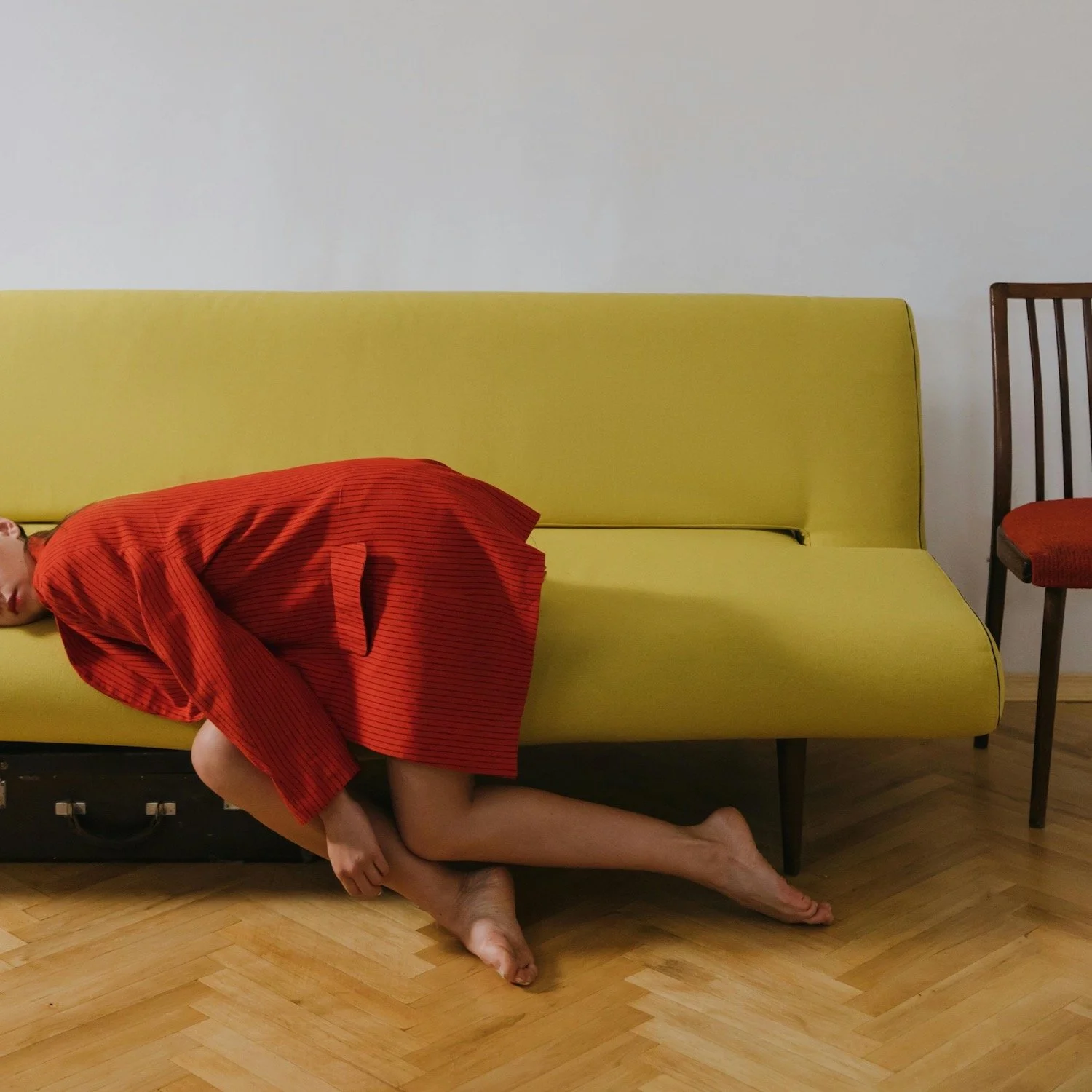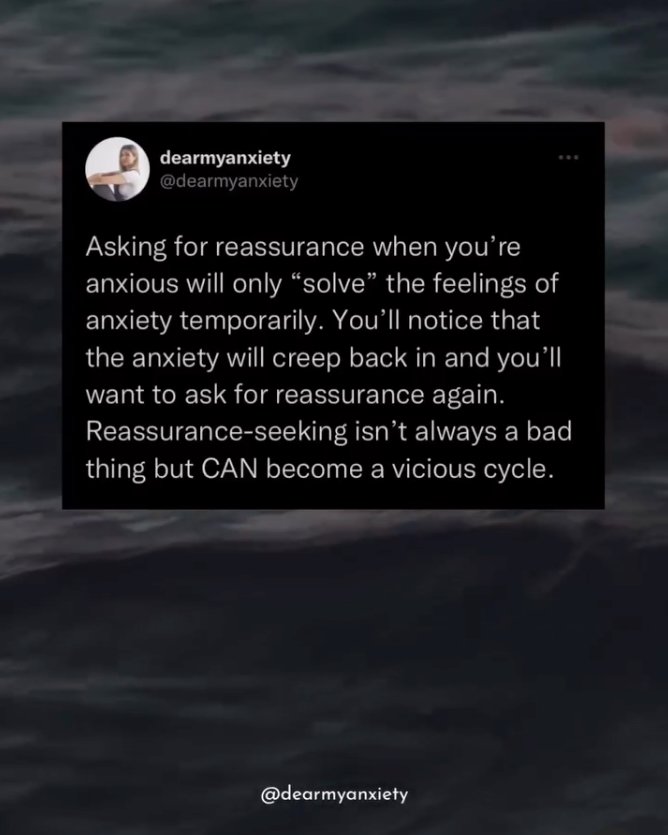This One Seemingly Harmless Behavior Could Be Fueling Your Anxiety
Here’s how to stop doing it.
by The Candidly Team
Uncertainty is like high-caloric food for our anxiety.
So it makes sense that minute we feel anxious, we look for answers. Googling every little symptom. Asking friends on repeat if they’re having a good time. Checking in 3 minutes after our partner drives away.
As far as anxiety-driven behaviors go, seeking reassurance might sound harmless enough. After all, aren’t we always telling those who are struggling with their mental health to be more vocal and to not turn inward with their problems?
But this behavior should not be confused with a healthy method of seeking support.
In fact, there can be a dangerous downside to excessive reassurance-seeking.
What is excessive reassurance seeking?
ERS is a common symptom of obsessive compulsive disorder and health anxiety, but it can also be a habit for those of us with general anxiety.
It differs from just innocently trying to gather information, because instead of being driven by a desire to calmly and matter of factly educate ourselves, we’re really just looking to relieve ourselves of our anxiety.
We may be fishing for a specific answer or for someone else to help us regulate, to assure us we’re going to be okay, or to tell us that we’re not at fault.
According to Bonnie Zucker, Ph.D. in her blog for Psychology Today, the reasons for an anxious person to seek reassurance can include:
Fear of catastrophe
With our logic being somewhat offline, we might feel like we need someone else to tell us the sky isn’t falling.
Discomfort with uncertainty
One of the biggest ways people with OCD learn to fight the disorder is by getting comfortable with the ever-present uncertainties of life. Asking for reassurance is just one way excessive worriers try to smooth over that uncertainty rather than face it.
To lessen personal responsibility
Many of us with anxiety have a sense of hyper-responsibility. We easily feel guilty or like it’s on us to make everything safe and everyone happy. By having someone else reassure us we’re not at fault or that everything is okay, we might feel momentary relief from this tension.
What does reassurance seeking look like?
People seeking reassurance as opposed to answers might:
Feel fueled by their anxiety
Have a sense of urgency
Be seeking out one specific answer that would make them feel better
Will ask more and more and more questions or keep repeating the same question even after they have the information
Ask people who are unqualified to give answers
Why does reassurance seeking make anxiety worse?
Seeking reassurance can ultimately worsen anxiety symptoms for the following reasons:
It tells your anxiety it’s important.
Giving center stage to our obsessive thoughts more or less tells our brain that our anxiety is real and important, and that we should therefore give it more attention instead of less.
It doesn’t build your own resilience.
When we rely on others to tell us we’re okay, it undermines our ability to do this for ourselves. This doesn’t mean we shouldn’t share what we’re feeling or allow someone to help us through it, but that’s a very different thing than asking that person to argue with our obsessive thoughts on our behalf, which doesn’t allow us to build up any of the tools that would make us stronger or more trusting of ourselves.
It offers short-term relief followed by a long-term cycle of anxiety.
It can feel pretty amazing to be reassured, but anyone with anxiety will tell you that that relief is short-lived. When we devote time and effort into workshopping a scary thought our anxiety feeds us, that anxiety will just keep feeding us more and more thoughts. So short-term, we might feel good, but that only lasts until a new thought takes the spotlight.
Again, none of this is about silencing ourselves when we’re suffering. Our goal to stop an unhealthy pattern of seeking reassurance should never be an excuse to keep quiet. Opening up to a loved one, asking for help, or seeing a therapist are all incredibly critical and responsible actions. But you can let someone know you’re struggling with anxiety without making the thoughts themselves the prime subject of the conversation.
Image from Instagram/ @dearmyanxiety
How do you stop excessive reassurance seeking?
1. Get to know your patterns.
Pay attention to what’s driving you to go to others and ask questions, either of others or even yourself. Does it feel like a compulsion driven by a pit in your stomach? Are you asking more than once? Repeating facts in your head?
2. Get comfortable with uncertainty.
The International OCD Foundation lists “accepting risk” as one of the tips to help people succeed in their OCD treatment. The more we’re able to say “I don’t know, and that’s ok,” the stronger and more hardy we become when facing the scary stories we tell ourselves.
3. Don’t waste time trying to negotiate with your anxiety.
Many OCD treatment programs advise not trying too hard to avoid anxiety. Instead, you might even be willing to go toward it as part of exposure and response prevention (ERP) therapy. Or you might agree with the anxious thoughts as a tactic to give them less power. Repeat the same obsessive thought to yourself long enough, you’re bound to get bored with it, and a common saying amongst OCD therapists is “You can’t be bored and scared at the same time.”
4. Practice mindfulness.
So here’s the big one. If our fears are making us anxious enough to go to someone else to calm us down, then we better have a good system in place to calm ourselves down instead. Mindfulness can be that system.
Mindfulness exercises teach us to live alongside our anxiety without getting too carried away by it or by the stream of thoughts its feeding us. Breathing exercises, meditation, and yoga can all be incredibly helpful.
We also put together a sort of toolkit of tasks that can help us all combat anxiety on a daily basis.
5. See a therapist.
If anxiety is intruding on you to the degree that it’s affecting your ability to concentrate, your relationships with others, or simply the way you feel in your one, precious life, you can and should seek help. Some of the tools out there are nothing short of life-altering, and there’s zero reason not to access them.
While it may not be comfortable at first, ultimately our ability to no longer need assurance from others to feel safe will build our resilience and give us more peace.
“In learning to tolerate anxiety without reassurance, one learns that they can handle their anxiety and that horrible catastrophe is not just around the corner,” wrote Zucker. “They will gain more confidence in their ability to cope, will exit the reassurance cycle, and will experience less anxiety in the future.”
This article is for informational purposes only. It is not intended to be used in place of professional advice, medical treatment, or professional care in any way. This article is not intended to be and should not be a substitute for professional care, advice or treatment. Please consult with your physician or healthcare provider before changing any health regimen. This article is not intended to diagnose, treat, or prevent disease of any kind. Read our Terms & Conditions and Privacy Policy.



















